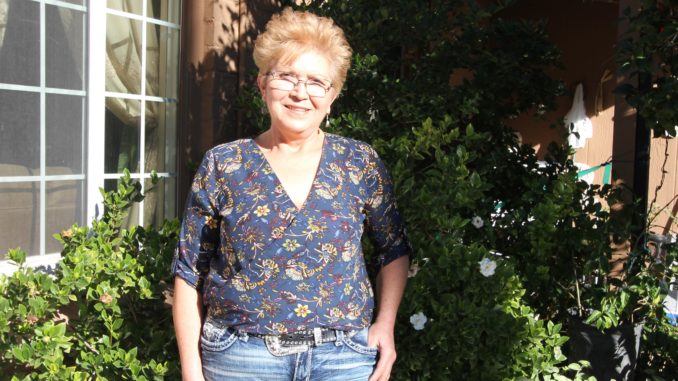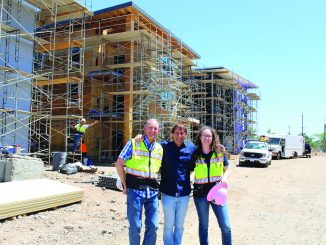
Marina Vega works hard to live in Chico. She’s been here since 1992, moving from Los Angeles to be close to family, and got her first job in 1996 at Chico Nut sorting almonds. She worked for some of the most recognizable companies in Butte County—Mooney Farms, Lundberg Family Farms, Sierra Nevada Brewing Company—before taking her current position as store cleaner for S&S Organic Produce and Natural Foods.
That was 11 years ago. Ten years ago, Vega started housecleaning on the side to supplement her income. She now cleans nine houses and one office a week on top of her weeknight shifts at S&S.
Money is a concern in her household, which includes her boyfriend of four years. He is a tree-cutter who contributes but also supports his family in Mexico. Vega, who emigrated from Mexico as a teen in 1979, has four adult children, one who’s deaf and lives with her.
“We worry [about] how we can do it,” she said, seated in the living room of her campus-area home. “And sometimes I get cancellations on the houses, so it’s hard for me.”
At S&S, Vega earns a couple dollars an hour over minimum wage. The mortgage on her house, which she bought in 2005, is roughly half her take-home pay after deductions for taxes and health insurance. According to the U.S. Department of Housing and Urban Development, affordable housing should take no more than 30 percent of gross income, including utilities.
Of course, she has other living expenses—“extra bills all of the time”—which have continued to climb over the years.
Nonetheless, Vega has no intention of leaving S&S or the Chico area. She likes her boss and workplace. She likes the community, where two brothers, three of her children and her grandson live—and which reminds her of her hometown, Guadalajara, with trees and greenery.
That choice comes with a cost.
“I don’t think things are going to get better [financially], I don’t think so, because everything is going up, up, up and high,” Vega said. “Everything is up and the salary is not very high.”
Largest gap
Vega has plenty of company with this concern. A recent report by financial news outlet 24/7 Wall St. found that the Chico Metropolitan Area (which includes Oroville and Paradise) has the widest income disparity among all California metro areas, with the top 20 percent of households averaging $253,472 a year and the bottom 20 percent averaging $12,420 (according to census data).
Meanwhile, in a county-by county comparison, 24/7 Wall Street determined the local cost of living is $37,557 per year for a single adult, $49,290 for a couple, $78,336 for a family of four—driven in large part by housing prices, with a median home value of $305,300 in Butte County.
The lack of affordable housing is at a crisis point in the Chico area and the rest of the county. According to a 2020 Affordable Housing Needs Report by the California Housing Partnership, the average rent in Butte County is $1,121, an amount that requires a single earner to make $21.56 per hour in order to cover housing as well as their other living expenses. That’s well above California’s minimum wage, which is currently $14 per hour for companies with 26 or more employees, $13 for those with 25 or fewer (set to increase $1 a year for the next two years).
The report also showed that 10,112 low-income renter households in the county don’t have access to housing they can afford and that 79 percent of extremely low-income households are paying more than half of their income on housing (compared to 4 percent of middle-income ones).
While the cost of living numbers locally fall a bit below state averages, that isn’t the case for health-care expenditures: $4,163 per single adult, $8,325 a couple, $12,597 for a family of four (compared to $3,711, $7,422 and $11,252 for the state).
Chicoans also spend an average of $10,641 a year on transportation and $7,876 on childcare. Local food costs, based on grocery store purchases for home cooking, are $3,301 for an adult and $9,532 for a family of four.
So, although the Chico area falls in the middle of the state in terms of average living expenses, economic disparities hit a significant portion of residents especially hard. U.S. Census Bureau statistics show 1 in 4 Chicoans live in poverty.
That’s before other specific local challenges at play. Economist Robert Eyler lists these in a report recently released by 3Core, the North State economic development district that includes Butte County. Water, wildfire, the COVID-19 pandemic and insurance-coverage issues have distinct impacts in this area, on top of housing and employment.
“The assumption that you’re just going to put jobs out there like you used to 15 or 17 months ago may not work,” Eyler says in the report. “There could be what economists call scarring, meaning specific industries … will be unable to employ the same number of workers they had pre-pandemic because those workers are gone. ‘Gone’ in the sense that they’re gone to another locale, they’re gone to another career, or there’s some structural reason—continued childcare issues, for example, or the debilitating effects of COVID for some who got sick.”
He also noted the effect on the housing market of relocating retirees: affluent newcomers adding to an already high demand for a constrained supply.
Exacerbating these local pressures, consumer prices statewide and nationwide have spiked due to inflation—up 6.2 percent in October (the most recent index available at press time) compared to the previous year. That’s the largest annual leap in three decades and felt especially in California, which has the highest percentage of residents living in poverty.
Vega, like other locals, feels the pinch.
“It’s hard, because everything is expensive,” she said. “The house is expensive, the food is expensive right now, the gas—and it’s hard. That’s why I have a second job. And it’s not enough.”




Be the first to comment